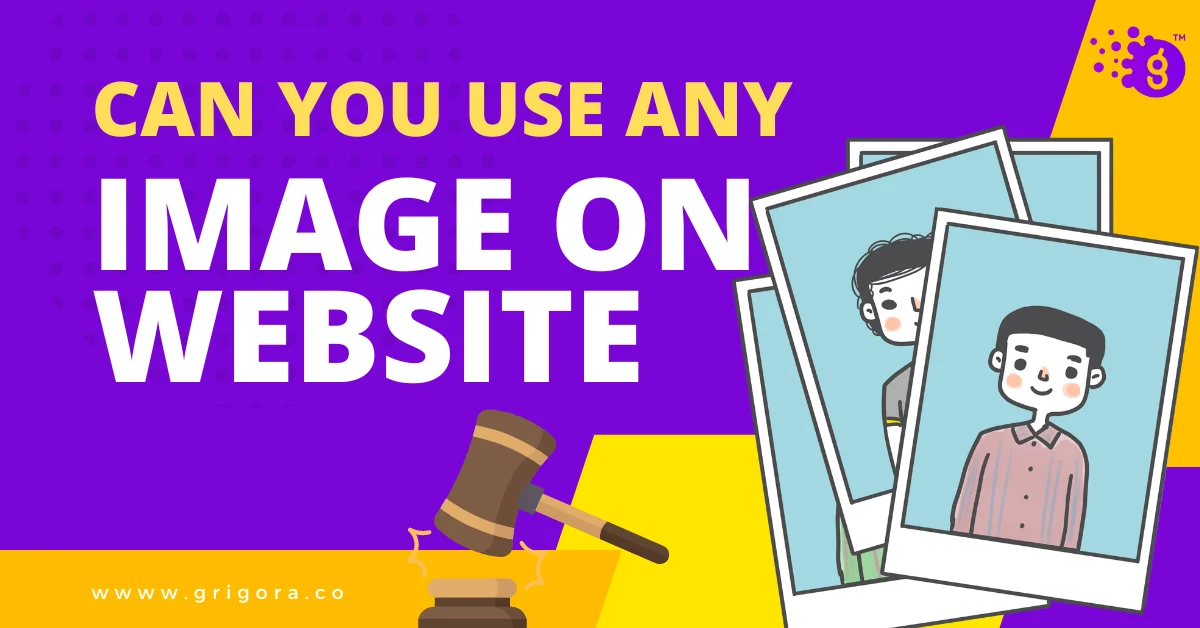Introduction
Welcome to the Intricate World of Image Usage on Websites
You might think that using images on your website is as simple as a drag-and-drop. But hold on a minute! There's a lot more to consider, especially when it comes to the legalities involved. Navigating the complexities of image usage is more than just choosing a pretty picture; it's about understanding the laws that govern these visual assets.
The Critical Importance of Understanding Image Rights
Ever heard the saying, "A picture is worth a thousand words"? Well, in the digital world, it could also be worth thousands of dollars in legal fees if you're not cautious. Understanding the rights associated with images isn't just a good-to-know; it's an absolute must for anyone who owns or manages a website.
So, why is it so crucial to understand image rights? Imagine waking up one day to find out you're being sued for thousands of dollars for using an image you didn't own. Scary, right? That's why we're here to dive deep into this topic and give you the lowdown on what you can and can't do when it comes to using images on your website. Let's get started!
Understanding Image Copyright

What Exactly is Copyright Anyway?
Copyright is like a virtual fence that surrounds your creative work, keeping it safe and sound. In the context of images, it means that the person who took the photo or created the graphic has exclusive rights to it. They get to decide who can use it, where it can be displayed, and so on. So, if you're thinking of using someone else's image on your website, you'll need their permission. Otherwise, you're trespassing on their creative property.
Hold Up, What's Copyright Infringement?
Copyright infringement is when you cross that virtual fence without permission. In simpler terms, it's using someone else's image without their consent. This can lead to legal consequences, and let's be honest, it's just not cool. You wouldn't want someone to take credit for your hard work, would you?
Ever Heard of the Fair Use Doctrine?
Now, there's something called the "Fair Use" doctrine, which is like a small gate in that virtual fence. It allows people to use copyrighted material under specific conditions, like for educational purposes, news reporting, or commentary. But—and it's a big but—there are limitations. Fair Use doesn't give you a free pass to use someone else's image however you like. You still have to consider factors like how much of the image you're using, whether you're making money from it, and how your use affects the image's value. So, tread carefully.
Types of Image Licenses
So, What's the Deal with Creative Commons?
Creative Commons is like the friendly neighbor who lets everyone borrow a cup of sugar. There are different types of Creative Commons licenses, each with its own set of rules. Some let you use the image for anything, even commercially, as long as you give credit. Others might allow only non-commercial use or forbid you from altering the image. The key takeaway? Always read the fine print.
Royalty-Free Doesn't Mean Free, Folks!
When you hear "Royalty-Free," you might think, "Awesome, it's free!" But hold your horses. Royalty-Free means you pay for the image once and then you can use it as many times as you like, without paying additional fees. However, there are usually restrictions, like you can't resell the image or use it on products for resale.
Rights Managed: The VIP Section of Image Licenses
Rights Managed is like booking a VIP table at a club. You pay for exclusive rights to use the image in specific ways, like for a particular ad campaign or time period. This is often more expensive and comes with a lot of rules. So, make sure you understand what you're signing up for.
Cases Where You Can Use Any Image on Your Website
| Case | Description | Examples | Notes |
|---|---|---|---|
| Public Domain | Free from all copyrights. | Old paintings, government publications. | Double-check the status. |
| Creative Commons Zero (CC0) | Use for any purpose without attribution. | Pixabay, Unsplash. | Read the license. |
| Fair Use | Limited use of copyrighted material. | Thumbnail in a book review. | Complex legal doctrine. |
| Stock Photos | Bought from stock photo websites. | Shutterstock, Getty Images. | Follow the license terms. |
| User-Generated Content | Submitted by users for your use. | Customer reviews with photos. | Get written permission. |
| Company-Owned Images | Created by your company. | Product photos, staff photos. | You own the copyright. |
| Free Image Resources | Free images with various licenses. | Pexels, FreeImages. | Read the license. |
| Partner or Affiliate Content | Provided by partners for promotional use. | Logos from a partner company. | Requires a contract. |
Risks of Using Unauthorized Images
Legal Consequences: More Than Just a Slap on the Wrist
Using copyrighted images without permission isn't just frowned upon; it can land you in hot water legally. You could face hefty fines, and in extreme cases, even legal action. Trust me, you don't want to be on the wrong side of a copyright lawsuit.
SEO Impact: Don't Let Google Put You in Time-Out
Search engines like Google are pretty smart. If they catch you using copyrighted material without permission, they can penalize your website. This means lower rankings and less visibility. In the SEO world, that's a big no-no.
Brand Reputation: Your Good Name is on the Line
Using unauthorized images can seriously tarnish your brand's reputation. It's not just about legalities; it's about ethics too. People are less likely to trust a brand that cuts corners and takes shortcuts. So, think twice before you drag and drop that image into your website.
How to Safely Use Images
Stock Photos: A Picture's Worth a Thousand Words, but Check the Fine Print
Stock photos can be a lifesaver when you need high-quality images in a jiffy. But hold on, before you start downloading, make sure you read the licensing terms. Not all stock photos are created equal. Some have restrictions on usage, so always double-check.
Free Image Resources: No Strings Attached, Mostly
There are plenty of websites out there offering free images. Unsplash, Pexels, and Pixabay are just a few. But even "free" can come with some conditions. Always read the licensing terms. Some free images require attribution or have other limitations on usage.
Creating Your Own Content: Be the Artist You Were Born to Be
If you're feeling creative, why not make your own images? This way, you own the copyright, and you control how they're used. From smartphone photography to simple graphic design tools like Canva, creating your own content has never been easier.
Case Studies: Real-World Consequences of Image Copyright Infringement
ChatGPT and Copyright Infringement Lawsuits
ChatGPT, a generative AI model, has been at the center of multiple lawsuits concerning copyright infringement. The model was trained on a massive dataset that includes copyrighted content gathered without consent. Lawsuits have been filed against Stability AI, Midjourney, and DeviantArt, among others. Comedian Sarah Silverman also filed a lawsuit against OpenAI and Meta, alleging that ChatGPT was illegally trained on pirated copies of their books. OpenAI has since filed a motion to dismiss these class-action lawsuits.
Source: VentureBeat
Writers Guild of America vs. OpenAI and Meta
The Writers Guild of America, along with other artists like Sarah Silverman, Christopher Golden, and Richard Kadrey, have come out against ChatGPT creator OpenAI and Meta over claims of copyright infringement. The guild is pushing to ban the use of AI-generated content.
Source: ComputerWorld
New York Times Contemplating Lawsuit
The New York Times is considering suing OpenAI for copyright infringement, alleging that ChatGPT's dataset includes content from the newspaper.
Source: MSN
Hollywood Strike Over Intellectual Property
The economics of the movie and TV business are being impacted by AI, leading to a strike by writers and actors in Hollywood. Major news companies are also taking steps to protect their intellectual property.
Source: New York Times
FAQs: Navigating the Maze of Image Copyright
Can I Use Any Image from Google on My Website?
No, you can't just use any image you find on Google for your website. Many images are copyrighted, and using them without permission could lead to legal issues. Always check the licensing information before using an image.
How Do I Know if an Image is Copyrighted?
If an image doesn't explicitly state that it's free to use, assume it's copyrighted. Many websites that offer images for free or for purchase will provide licensing information. If you're unsure, it's best to contact the image creator or owner for clarification.
What Are Some Trusted Sources for Free Images?
There are several websites where you can find free-to-use images, but always read the licensing terms. Some trusted sources include Unsplash, Pexels, and Pixabay. These platforms offer a wide range of high-quality images that are free from copyright restrictions or licensed under creative commons public domain dedication.
In Conclusion: Why Diligence in Image Copyright Matters
In today's digital age, images play a pivotal role in enhancing the visual appeal and credibility of your website. However, the convenience of sourcing images online comes with its own set of responsibilities—chief among them is respecting image copyrights and licenses. Ignorance is not bliss when it comes to legal matters; failing to adhere to copyright laws can lead to severe legal consequences, damage your SEO rankings, and tarnish your brand's reputation.
Being diligent about where you source your images from and how you use them is not just a legal necessity but also an ethical obligation. It reflects on your integrity as a website owner and a content creator. So, the next time you're tempted to use an image without proper authorization or licensing, remember that the risks far outweigh the convenience.
In a nutshell, understanding and respecting image copyrights and licenses is not just a good practice—it's essential for anyone who owns or maintains a website.



